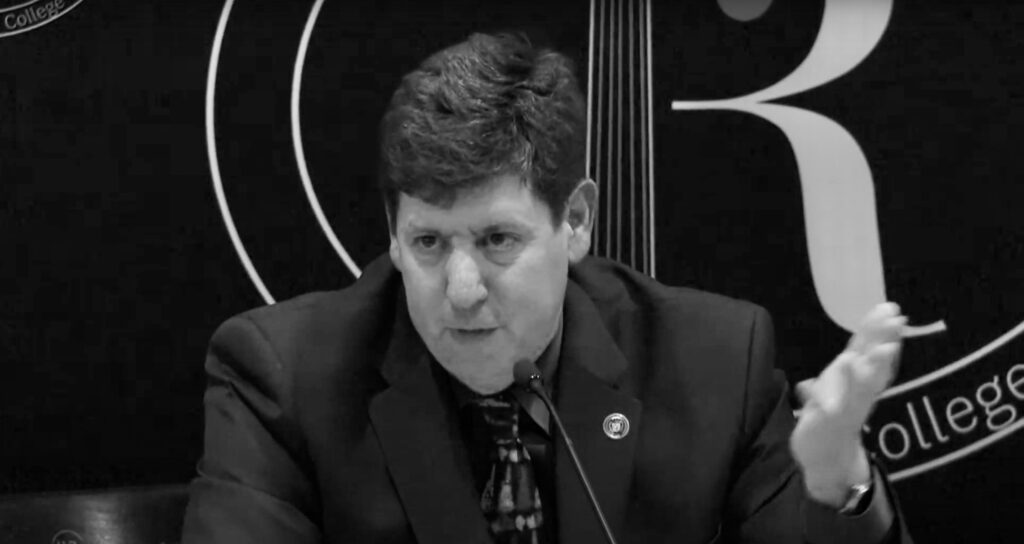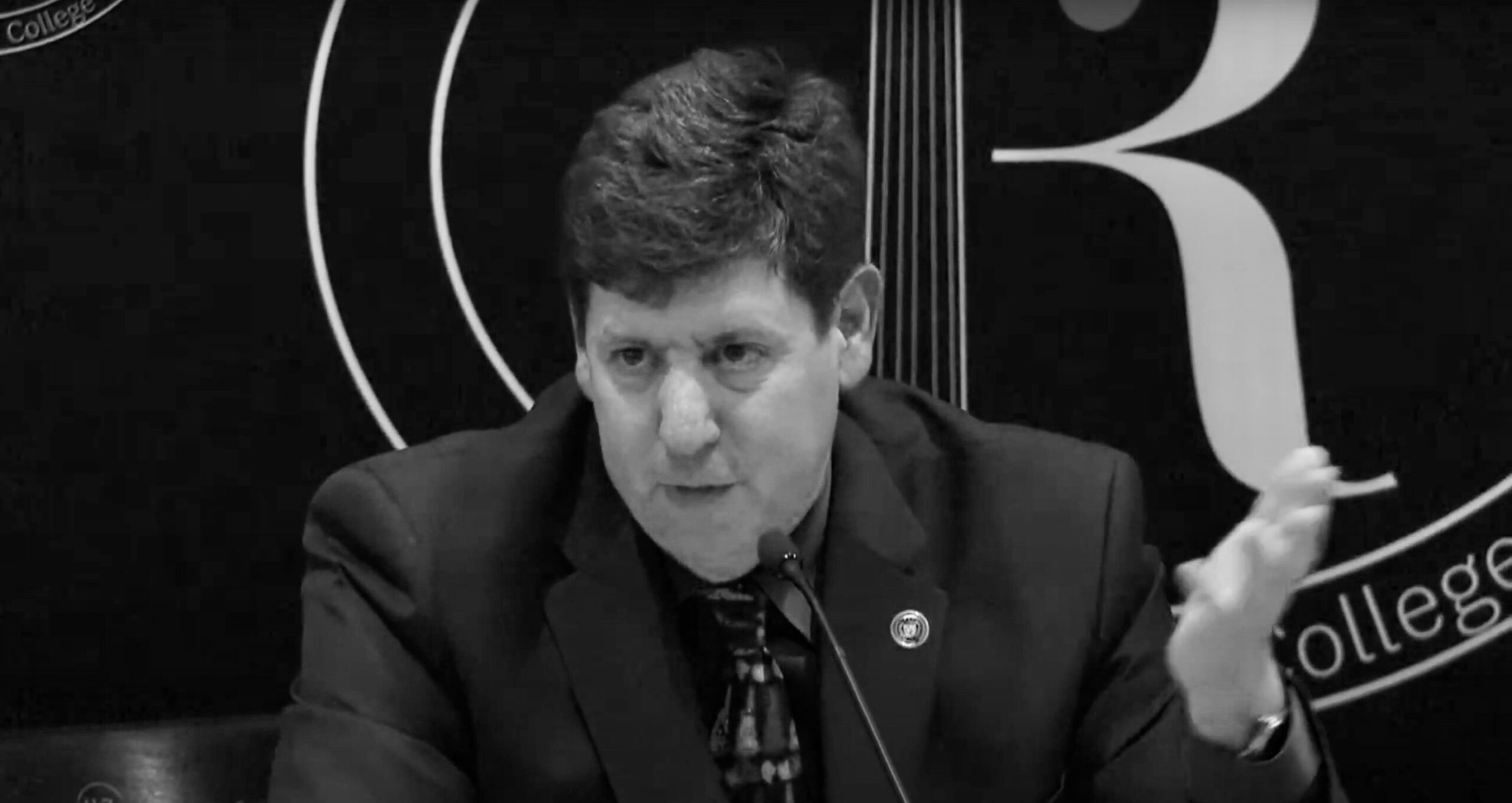
On February 21, Steven Dettelbach ’88, Director of the Bureau of Alcohol, Tobacco, Firearms, and Explosives, came to Dartmouth to discuss gun violence in America for the Rockefeller Center. Prior to his appointment by President Biden, Dettelbach served as a U.S. Attorney for the Northern District of Ohio and as a federal prosecutor in the civil rights divisions of three U.S. Attorney’s offices. He also served as counsel to the Senate Judiciary Committee following the September 11 attacks.
Dettelbach has served as Director of the ATF for over a year. The ATF has an important history, from Al Capone and the stills of the Prohibition years to Waco, the Oklahoma City bombings, and the September 11 attacks, and Dettelbach is proud of the organization he leads today.
The operations of the ATF are primarily concerned with the endemic of shootings in America. Dettelbach stated that not a day goes by without scores of gun violence occurring—one day in the United States sees more gun-related deaths than does an entire year in the United Kingdom. We at The Review believe that it is time to get past the rhetoric and politics of this issue, because thus far this “dialogue” has only hindered viable solutions. The prevention of gun violence ought to be a bipartisan priority, not the polarizing source of political deadlock that other issues prove to be. The stakes are simply too high.
Dettelbach took time to explain the organization of the ATF. Its officials are at once agents of law enforcement and the chief regulators of firearms and explosives. With a huge mission but scarce resources to support it, Dettelbach insisted that the ATF is way too small (apologies, libertarians). The advantage of the ATF lies in its partnerships with other law enforcement agencies and expertise in firearms investigations, specifically in regards to ballistics.
Dettelbach focused on the automatic machine guns that, he said, “have come pounding back to American streets like jackhammers.” He recalled the impact that shootings like those at Columbine and Virginia Tech had on the American people. To Dettelbach, these developments were the impetus for a call to action. The ATF has a “patriotic duty to respond,” and Dettelbach sees the agents as true heroes. While gun violence requires mobilization against evil forces, the image Dettelbach paints is one of federal agents obligated to take away villainous machine guns, rather than those guns which serve protective purposes.
It is significant that Dettelbach never once mentioned mental health, which I consider to be one of the root problems of this gun crisis. He emphasized that law-abiding gun owners do not support gun violence, and to suggest so makes no sense. Dettelbach also expressed the need to combat the issue of criminals, as well as guns. However, those are easy concessions to make. No thoughtful person believes all gun owners are murderers; nor does he or she want to set actual murderers free on the streets. Conservatives are often criticized for attributing mass shootings to mental health, but almost invariably that’s the exact cause of the massacre. It is, quite frankly, dishonest and irresponsible to discredit (or attempt to minimize) mental health as a problem.
The ATF’s strategy, Dettebach says, consists of what he calls Crime Gun Intelligence (CGI). He prides their ability to squeeze every bit of information out of a “crime gun,” their term for a gun used in a criminal event. Through tracing, the ATF can track a serial number to its purchase. This can lead to crucial action to catch killers. Last year, he said, the ATF traced over 600,000 guns through this process. The agency has also developed a new peer-reviewed tool to extract DNA from expended cartridge cases. These new technologies are certainly good steps to addressing crime.
Another strategy of the ATF is to engage in national education campaigns for safe storage of firearms, which, as simple as it sounds, is essential. Dettelbach asserts that along with the Second Amendment comes the responsibility to store guns safely. We at The Review wholeheartedly agree. Along with the rise of gun violence has come a change in culture. People no longer give respect to the gun and its power. Dettelbach mentioned the once-common phrase, “Treat every gun like it’s loaded, son.” As someone who grew up with this culture in the hunting seasons of rural New Hampshire, I know the value of gun education and responsibility.
The National Rifle Association ought to be a formidable force in this effort, as its original mission dictates. Gun-safety education should be improved and expanded throughout the country, and we applaud Director Dettelbach’s recognition of this fact. Yet rhetoric from the left renders this education harder to achieve. When guns are attacked and the people who own them looked down upon, it inculcates a culture of contempt and irresponsibility. Hence, we have people stockpiling their guns in a threatening manner as opposed to locking them up and teaching their children properly.
Dettelbach also addressed loopholes that allow criminals to access guns. Among them are Privately Manufactured Firearms (PMFs), or “ghost guns.” People can sell kits that, when assembled, become fully functioning firearms. They are sold without background checks and serial numbers, allowing them to enter the black market. By contrast, licensed arms and ammunition stores are required to follow strict regulatory procedure. Cracking down on these ghost guns should certainly be a compromise the right is willing to consider. To be sure, banning shady firearm dealings would not infringe on any freedoms. At the same time, overscrupulous tracking procedures mustn’t be targeted at law-abiding gun owners.
Dettelbach concluded his prepared remarks with optimism. At our best, he said, we listen, discuss, and compromise. We are not paralyzed in the face of trouble, but we act courageously. At the end, we must be willing to sacrifice our preferences for the greater good of our children and future generations. He trusts what the data tell him: Crime is going down, and we need to keep fighting inch by inch to ensure that remains the case.
Dettelbach is entirely correct, although one might assume he’s directing this advice toward Republicans. Equally as important, Democrats need to stop the heated rhetoric and should work with Republicans. Some do. However, many demand things that go too far, and instead of making progress, the country gets nothing. I don’t need to explain this partisan gridlock because it’s omnipresent by now, but it’s such a dangerous problem that it’s worth emphasizing again and again.
When confronted by a member of the audience for not doing enough, Dettelbach explained that his agency is constrained by the lawful commerce of firearms and the Second Amendment. “It’s not a strategy to save lives to pretend it’s not there,” he says. He noted that the Supreme Court creates a regime under which he has to operate, and there’s no point in denying that. While he did not directly address any Supreme Court ruling, he discretely hinted that their rulings prevent them from further gun restrictions. The Review is thankful for this current court, because it seems that it’s the only thing keeping a potential rogue ATF in-check.
In all, this event reeked of public relations, not academic aspirations. Dettelbach seemed to portray the ATF as a completely innocent, benevolent organization. He’s the director, and that’s what he should do, but we conservatives ought to avoid complacency. The ATF can be dangerous if it’s allowed to be, and we mustn’t take its word for absolute truth. Dettelbach said many things that can assuage gun owners’ concerns, but they weren’t concrete, and the agency’s actions matter more. We all want mass shootings to end, but big government isn’t the solution. The ATF should remain in the public eye at all times.

